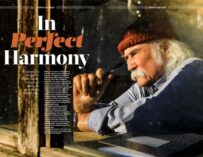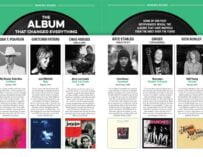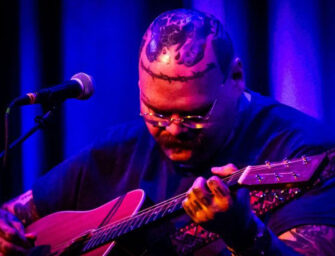
Josh T. Pearson: “I thought it might burn down my whole edifice from before.” Pic: Eliot Lee Hazel
The release of his surprisingly straight new album gave us the opportunity to chat with this hero of alternative country
In 2001, Josh T. Pearson’s band Lift To Experience released one of the classic albums of the early 00s which cast his home state as the Promised Land, within a swirl of shoegaze-inspired noise. His follow-up to The Texas-Jerusalem Crossroads came a decade later with solo debut Last Of The Country Gentlemen, a record that was as absorbing as it was gruelling. Detailing the breakdown of a relationship in Pearson’s own inimitable style, it garnered huge praise for the songwriter and established him as a master of quality over quantity.
Pearson returned last month with a new album, and a surprising one at that. Those expecting a direct follow-up to his 2011 masterpiece might be shocked at the immediate nature of The Straight Hits. The first half of the album in particular is a suitably straight dose of country rock, as if the only way to follow his previous effort was to remove the emotion and personal narrative, and come up with the yang to the former’s yin.
With such questions in mind, we caught up with Pearson shortly before the LP’s release…
It’s been a while since Last Of The Country Gentlemen. Can you explain some of the events that led up to The Straight Hits?
“Yeah, I try to put out a record every 10 years or so; Rome wasn’t built in a day [laughs]. No, I write all the time, I just don’t publish. My aesthetic wasn’t really to be a part of that system or wheelhouse. I hit the road for a while and just played gigs publicly in small places, writing songs whenever I could. It was more write, throwaway, write, throwaway… but I put out Country Gentlemen because that seemed like it needed to be done, and that it would do some good for some men out there. I went back off-grid after that.
“I got divorced and went for some divorce counselling. After the ex and I split up, we took a couple of years apart and then we came back and went to some counselling, just to try to figure out what the hell had happened and why two best friends would somehow grow to hate each other. That was really helpful, tremendously so, and I recommend it highly to any couple who are serious about their love endeavours.
“SUBMIT TO THE SONG, DO WHAT SHE TELLS YOU”
“I did that and moved out to Limestone County, was there for a couple of years getting better, stronger and healthier. I started coming to Austin, learned to dance and hang out at the honky-tonks down here, and met a new group of guys. I guess I’ve been on the road to recovery.”
Do you think you can hear that on the new tracks?
“These songs are pretty optimistic; a completely different headspace. It’s the first time I’ll ever be proactive, I think, with the art, where I want as many people to hear this stuff as possible. The other stuff by its design was limiting – 10-minute-long songs, pretty avant-garde boutique stuff – whereas this is written for the masses, intentionally so. I hope people like it, I really do want people to like it and feel joy and happiness.”
Did your approach to writing change with that in mind?
“It did. I had set rules that I put myself under. I’d just come off of finishing a record, I don’t know if anyone will ever hear it but it was a song cycle of music that I had for a decade and I could never get the words right. I finally cracked it and they were really detail-oriented long-form songs and it was a self-referential work, where each song pointed to itself, with hidden gems and lots of little Easter eggs.

Josh: “Take The Texas-Jerusalem Crossroads, we had two years to beat the shit out of those songs every day.”
“After coming out of that headspace, I wanted an exercise that was light-hearted and friendly, so I set some simple parameters for The Straight Hits which I abided by. I called it the ‘Five Pillars Of The Straight Hits’. That streamlined it and made it much easier. Since it wasn’t really first-person it was so much more freeing to be able to write as an exercise, so it was written quickly.”
Did you find that approach freeing?
“Absolutely, super-liberating. All the songs had to have a verse, chorus and a bridge; they had to have 16 lines or less in total (those could be repeated); they had to have the word ‘straight’ in the title; four-words or less in the title. Then the fifth pillar was that I had to submit to the song, above all the other pillars, which I think is the golden rule of songwriting. Submit to the song, do what she tells you.”
How did you settle on those pillars?
“I don’t know, I just thought, ‘What would a pop thing be?’ It’s out of my wheelhouse to even think about a verse or a chorus. It’s not the tradition I’m coming from; I’m more freeform, follow the spirit. So the idea of those constraints was there, and I thought 16 lines was good because it gives two verses and choruses with four lines in each. Four words in the title: I tend to have long titles so I just thought that’s nice to make it more succinct. And submitting to the song is self-evident. It was just an exercise and then I thought, ‘Well this is kind of fun, let’s try and make a record and put it out.’ It’s a totally different thing for me and I thought it might burn down my whole edifice from before. To change is to grow, to grow is to change.”
Where did the writing take place?
“I was crashed out in a friend’s house in Paris, just floating around. He’s got like five kids, he’s my age and ended up there. He’s living in one of those government-sponsored homes and he made his son sleep on the couch, so I was just crashed out in his son’s room with all his sports posters on the wall. It smelled like a locker room; you know teenagers stink all the time.”
Did you record it then too?
“It took two or three days to write and then a year to get it fucking recorded. Andy [Young] came down, the drummer, and we practised those drum songs for three days. I probably would have had more drums on the record if we’d had more than three days to practice. It wasn’t a conscious decision to have it so acoustic; we just didn’t have a lot of time so we did those three songs. It could have been a little bit better. Take The Texas-Jerusalem Crossroads, we had two years to beat the shit out of those songs every day.”
People might presume that you have been labouring away on this album ever since Last Of The Country Gentlemen. Clearly that’s not the case…
“I was labouring away on other songs, better songs. This one is priming the pump to get to those, I think. And it’s optimism, I just want to take happiness and shove it in people’s faces, I guess. The next one is more interesting from a songwriter position. They’re kind of country comedy songs, which are political satire – that’s where it gets real interesting.”
Were there times when specific songs took you places that you weren’t expecting?
A Love Song (Set Me Straight), that’s the gem on the record and the one that’s personal to me and took some real concerted time and effort, and you can feel it. That was the one that took me to task and said, ‘Do this,’ and then I fell in love with the girl who I’m with now and incorporated her and re-wrote it. I’m proud of that work and the whole record is for that song. It’s just meant to be fun and frivolous, you don’t have to dig too deep with most of it. It was very freeing for the rest of it not to have to dig into my soul.”
Fans of your music now have something to put on when they want to have a good time, not just when they need to do some soul-searching…
“God, I hope you’re right! That Gentlemen stuff was so heavy-handed. It’s the kind of album you listen to one time and don’t listen to again, at least for another year, because it requires so much from the audience. It’s devastating and I hope people can put this on repeat without causing too much emotional damage.”

Josh T. Pearson: “I needed to prove to myself and God that I could stand on my own two feet.” Pic: Eliot Lee Hazel
Is there a part of you that fancies going to Nashville with these songs to try and make a splash there?
“As I’ve gotten older and more confident in my writing, I know that I could write a badass tune any second that I will it. I had gaping wounds in my own psyche that I had to prove to myself, so I was never into co-writing or doing any of that stuff when I was younger, because I had something to prove in order to feel worthy. Now that I feel confident in my ability I’ve opened up to that idea. I just had too many problems when I was younger to do it.”
It always interests us how people can take something so personal and open up in a writing room full of relative strangers.
“I think a lot of Nashville guys are more centred and come from good families where a songwriting tradition was part of the family home – at least those are the guys that I’ve met. I didn’t come from that, I came from a shitstorm of brokenness and I didn’t want to share any of my toys. I needed to prove to myself and God that I could stand on my own two feet. But now that I’m older and more settled it’s fun just playing around with friends. But I still don’t want to give my treats away – that’s for my stuff.
“Those songs are just greasing the wheels for that section of pop America, the work force. It’s family-based; they shouldn’t dig deep. They don’t need to listen to Last Of The Country Gentlemen. This boutique stuff that you and I are into, thankfully we’re a small niche. When certain people tell me they heard that record and it didn’t do anything for them it’s like, ‘Thank God!’ That means they’re in a position in their life where nothing in that tragedy would resonate with them – they’ve probably had a good life. It’s sad when people say that record means so much to them. It’s like, ‘God I’m so sorry for whatever shit happened in your life for that to vibrate with you, give me a hug.’”
Do you feel the weight of expectation?
“I don’t know. The life I’ve lived, there’s no threat of that. I live in Austin, Texas and no one here knows what I do at all. I can’t get a gig here to save my life. I have to explain what I do for a living! There’s concern about the label. Had I been safe I would have just put out the same record; I wish I could have, but I don’t play by those rules. If it’s not dangerous to me then it doesn’t excite me. I need to do something that’s challenging. I’m in my 40s now and I want to start leaving a mark. I’d love to put out a record a year, or two even. I’ve definitely got the material and I really think once all those other albums come out it will all make sense. They’re all a different shade, a different style of songwriting, a different colour and vibration.”
Why do you think people from that side of the world haven’t taken to your music in the same way?
“I haven’t done the work over here, I don’t think. I was living overseas for almost eight years. I’m touring in the US in a couple of weeks and that will be the first time I’ve ever toured solo here, ever. I needed to travel and explore when I was younger. I think that’s partly it and also earlier the Lift stuff was too avant-garde at the time, people couldn’t really catalogue it and that scares them. We didn’t have a label or support over here to really push it.”
Is there a thread through all of your work which reveals what songwriting means to you?
“It’s therapy man, just to keep the healing process going”
Any final thoughts for us?
“If I could say anything to Songwriting Magazine it would just be that I’m saddened by the loss of iambic meter. From a songwriting tradition, iambic meter is dying and I hate the new form where it’s all stilted and there’s no flow in the language. It’s now about recreating the syllables to fit their own time and meter, it’s not a river that flows smoothly, it’s white water rapids. That’s fun but I’m coming from a tradition that grew up reading the King James Bible and the language of Shakespeare, where every other syllable has an emphasis on it.
“Take someone like Dylan, where if you read all of his stuff from the 60s it’s pure poetry. Every other syllable is on a meter and I love it and I miss it and I think that’s partly why I don’t listen to stuff now. You think of, ‘To dance beneath the diamond sky, with one hand waving free.’ The meter of that! Because he’s coming from a tradition of early songwriting where all of those songwriters read King James and this language that was intentionally designed to be memorised like a smooth flowing river. That’s a real loss. Imagine Bob Dylan in a writing room, why would he write with someone else?”
Interview: Duncan Haskell
The Straight Hits is out now. For all the latest, head to mute.com


































Related Articles